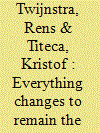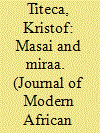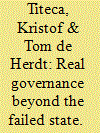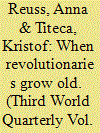|
|
|
Sort Order |
|
|
|
Items / Page
|
|
|
|
|
|
|
| Srl | Item |
| 1 |
ID:
099371


|
|
|
|
|
| Publication |
2010.
|
| Summary/Abstract |
Associations have been labelled the main 'building blocks' for creating social capital. It has been argued that community associations need to transform 'bonding' into 'bridging' ties to 'reach out' while also creating 'linking' ties to 'scale up'. External development actions follow a reverse logic in promoting these associations: they assume that linking ties with the external intervener will reinforce prior social capital endowments. This article highlights the inherent difficulties of such a 'social engineering' approach in the context of post-conflict reconstruction, describing three development interventions in the north of Burundi. It defines the process of 'institutional syncretism' - merging local with global institutional settings - as a key element to social capital building. The findings illustrate how the three interventions failed to reach this objective, and question 'bridging' associations as 'universal blueprints' for restoring social cohesion within the liberal peace model for post-conflict reconstruction.
|
|
|
|
|
|
|
|
|
|
|
|
|
|
|
|
| 2 |
ID:
145964


|
|
|
|
|
| Summary/Abstract |
South Sudan is in a unique combination of (post)-conflict reconstruction and the birth of a new state in which old policies are re-activated and new policies introduced. By looking at three case-studies of taxation and private sector regulation reforms, the paper will show how the overlapping and often contradictory regulatory frameworks of the state provide the setting for bricolage strategies by different actors. These actors, and particularly state officials, rely on a variety of institutional resources to implement, resist or remake certain regulatory measures. Although the breadth of regulatory measures has increased exponentially, the institutional corridor – the space in which bricolage is performed and on which various actors can rely – remains narrow. This space is contingent on wartime authority structures, and more particularly pre-existing Sudan's People Liberation Army/Movement (SPLA/M) power structures, as well as a deep-rooted resistance to centralised control. Importantly, these regulatory practices are not fixed: intense periods of rearrangement of the social order or ‘open moments’ may provide a window of opportunity for regulatory reform.
|
|
|
|
|
|
|
|
|
|
|
|
|
|
|
|
| 3 |
ID:
137757


|
|
|
|
|
| Summary/Abstract |
During the last decade, the Lord's Resistance Army (LRA) became a regional problem in the border area of the Democratic Republic of Congo, South Sudan, and the Central African Republic, involving multiple national and international actors. This article explains why these actors often present diametrically opposed images of the LRA instead of developing a unified vision. More specifically, the article discusses how the Ugandan and Congolese governments and armies, and the US government and advocacy groups, each frame the LRA differently. These various frames are influenced by the actors' interests and by the specific historical development of political relations between them. Politically influential constituencies played a significant role in this endeavour. In the US, lobby groups such as Invisible Children, Enough, and Resolve had an important impact on the way in which the American government framed the LRA. Conversely, the lack of such a powerful constituency in the LRA-affected countries gave these governments ample space to frame the LRA in a variety of ways. The lack of reliable information about the current capacities of the LRA, combined with the LRA's lack of a strong and coherent image, further contributed to this situation. In short, the ways in which the LRA is framed enabled these key actors to pursue goals that may remain distant from the reality of the LRA.
|
|
|
|
|
|
|
|
|
|
|
|
|
|
|
|
| 4 |
ID:
148460


|
|
|
|
|
| Summary/Abstract |
This article discusses the case of the Allied Democratic Forces (ADF) rebel group in the Democratic Republic of Congo (DRC). It shows how a variety of actors that have opposed the ADF group have framed the rebels to achieve a range of political and economic objectives, or in response to organizational and individual limitations. The DRC and Ugandan governments have each framed ADF in pursuit of regional, international and national goals separate from their stated desires to eliminate the armed group. The UN stabilization mission in Congo's (MONUSCO) understanding of the ADF was influenced by organizational limitations and the shortcomings of individual analysts, producing flawed assessments and ineffective policy decisions. Indeed, the many ‘faces’ of ADF tell us more about the ADF's adversaries than they do about the rebels themselves. The article shows how the policies towards the ADF may not be directly related to defeating a rebel threat, but rather enable the framers (e.g. DRC and Ugandan governments) to pursue various political and economic objectives, or lead the framers to pursue misguided operational plans (e.g. MONUSCO). In doing so, the article highlights more broadly the importance of the production of knowledge on conflicts and rebel groups: the way in which a rebel group is instrumentalized, or in which organizational structure impact on the understanding of the rebel group, are crucial not only in understanding the context, but also in understanding the interventions on the ground.
|
|
|
|
|
|
|
|
|
|
|
|
|
|
|
|
| 5 |
ID:
090316


|
|
|
|
|
| Publication |
2009.
|
| Summary/Abstract |
Recent studies on vigilante groups show how they often begin as popular schemes for imposing order, before degenerating into violent militias which contribute in turn to social and political disorder. The Masai, a group of khat sellers and consumers in the Ugandan border town of Bwera, represent a more complex case. By using vigilance tactics in the provision of security, the Masai actually help to shape public authority within Bwera town instead of creating institutional chaos. They also provide a range of services, imposing a degree of order on illegal cross-border activities in the area. However, a closer look at the Masai shows that their vigilance activities are mainly performed out of self-interest, as a quid pro quo enabling them to continue their illegal activities of smuggling, general criminality outside town and illegal drug use. Therefore they straddle the 'crime or social order' dynamic, representing a criminal gang of illegal drug traffickers which also provides services for public community interests. As such, they contribute to both order and crime.
|
|
|
|
|
|
|
|
|
|
|
|
|
|
|
|
| 6 |
ID:
103715


|
|
|
|
|
| Publication |
2011.
|
| Summary/Abstract |
n the Democratic Republic of Congo (DRC), the state administration has retreated from much of the public domain. The specific case of the education sector - a domain traditionally reserved for the state - shows how public services continue to be provided, and how the Congolese state continues to survive and transform itself. Although no overall power governs the system - there is no overall regulatory authority - this does not mean that the education sector is ungoverned. The state survives as an administrative framework whose role in providing public services has been redefined rather than evaporated. This article describes the organization of the educational system as the direct result of an evolving negotiation process between state and non-state actors. It shows how this negotiated nature of statehood, and the power differentials between the various actors, involve constant renegotiation. Instead of producing uniform results within the education sector, this form of regulation depends on power configurations in particular localities at particular times.
|
|
|
|
|
|
|
|
|
|
|
|
|
|
|
|
| 7 |
ID:
161720


|
|
|
|
|
| Summary/Abstract |
In the last decade, there has been a major growth in the illegal ivory trade. Although this trade has been analysed from a variety of angles, one perspective is missing in the literature, namely the individual ivory trader. Based on in-depth research among illegal ivory traders in Uganda—which is a major transit point of ivory—this article aims to fill this gap. In doing so, and by linking their activities with the literature on the informal economy and the criminalization of the state, the article shows how various structural circumstances—such as war, globalization and the presence of foreign buyers—had a profound impact on the ways in which the illegal ivory trade was conducted. Initially, these circumstances created an increased market, both in supply and demand, which led many traders to engage in this trade. However, an increased crackdown on the illegal ivory trade has made the conditions much more difficult. By analysing how ivory traders navigate these structural circumstances, the article shows a gradual criminalization of the trade. In other words, the more ivory became criminalized, the more criminal linkages were needed to remain active in the trade, and the more significant power differences became.
|
|
|
|
|
|
|
|
|
|
|
|
|
|
|
|
| 8 |
ID:
154795


|
|
|
|
|
| Summary/Abstract |
The liberation struggle plays a crucial role in providing legitimacy for post-liberation regimes. This was the case for the Museveni regime, for whom the liberation argument provided strong moral authority, and a legitimising foundation for its patronage and coercion strategies. But what happens when the liberation argument ‘grows old’, i.e. when the liberation generation elite starts to die or defect, and the young population is no longer impressed by the liberation argument? This article argues that in response to this changing situation, the Museveni regime almost exclusively relies on patronage and coercion, yet is increasingly devoid of the legitimising liberation foundation.
|
|
|
|
|
|
|
|
|
|
|
|
|
|
|
|
|
|
|
|
|